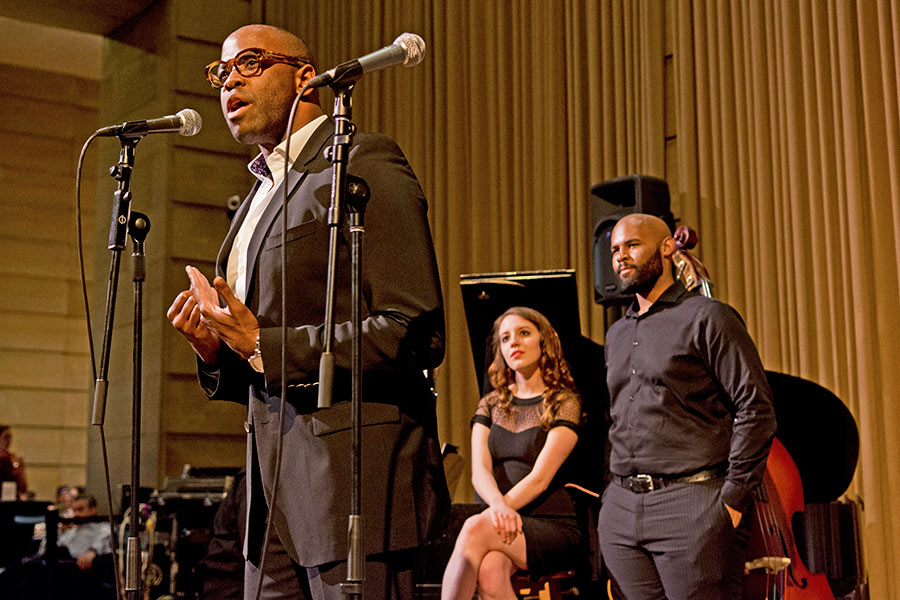Charlie Parker may have died in 1955, but his music is no less innovative nor his life any less than operatic — with its tragic, wasted genius, obsessive desire to be ruled by (and violent to) women and bouts with racism, drug addiction and self-doubt. If that life ain’t worth an opera, no one’s is.
Opera Company of Philadelphia will present the world premiere of Parker’s “Yardbird” this weekend, with bel canto tenor Lawrence Brownlee as the famed saxophonist; soprano Angela Brown as his mother, Addie; and baritone Will Liverman as his pal Dizzy Gillespie.
What you might not get a chance to hear (unless Brownlee or Liverman break a leg or bust a pipe) is tenor Joshua Stewart and baritone Jamez McCorkle.
Both Opera Philadelphia vocalists who made a huge sonic splash at last month’s “Taste of Opera” preview event at the Philadelphia Museum of Art are cover singers — Stewart for Brownlee and McCorkle for Liverman. Both singing/acting gentlemen also happen to be gay.
When it comes to 28-year-old, New Orleans-born Stewart, he didn’t get to opera through love of the genre.
“I thought opera was boring and was totally against everything, besides technique, that I was being taught at my arts high school. The only reason I was there was to ‘get a classical technique’ and go back to jazz,” Stewart said. “My mother said I sang before I could speak. Jazz became my first musical language and then classical. Jazz will forever be my, what the Germans call, ‘herzblut.’”
Stewart found his voice early — in the home — when, as a child, he was mistaken for his mother when answering the phone.
“I’ve always sung high easily, but secretly I’ve always wanted to be a bass,” he said. “Maybe that’s why I speak so low now.”
Ask Stewart how he got to Opera Philadelphia and he uses the always-corny (but still funny) line, “The same way you get to Carnegie Hall: Practice, practice, practice,” as he wound up at OP after seven years of Curtis Institute of Music study.
Like McCorkle, Stewart gets that opera is yeoman’s work, especially considering his role in “Yardbird’s” cover cast — a small, tight crew of singers who know every nuance of the opera, as they must be prepared to fill in at any moment.
“It’s like sitting on the bench waiting to get called in to the game. You literally can’t miss a beat,” Stewart said of being Brownlee’s shadow. “We’re always there watching and learning the staging, but also the meaning behind every movement.”
Like Stewart, 25-year-old McCorkle — also originally from NoLa and also a student at Curtis — is part of the cover trio ready, willing and able at all times to jump in for their assigned leads.
“You know, everyone wants to be singing on the main stage fresh out of the womb, but I’ve come to learn as a young singer that you have to put in your dues,” McCorkle said. “It’s our duty as young singers to lift up each other around us and build up rapport with our colleagues. As Angela Brown told me, ‘Honey, your time will come.’ It means that we get to know the guys who are at the top of our field. Get to talk to them, go out for dinners, house parties and become friends along the way. It’s not every day you get to kick Lawrence Brownlee’s butt in ping pong.”
Opera Philadelphia has become like family to McCorkle, a child-prodigy classical pianist who played with orchestras around the United States until one fateful family church session watching the choir director — Joshua Stewart — performing solo changed his mind.
“He probably doesn’t even know that he was the one who inspired my interest in singing from hearing his beautiful rendition of ‘Total Eclipse’ by Handel his senior year. After hearing it, I went to the voice teacher at my arts high school, New Orleans Center for Creative Arts, and asked her for the music,” he said. “I remember her looking at me puzzled as to ‘what in the world was this pianist going to do with it?’”
He took it home, learned it, sang for her the next day and, on Nov. 20, 2006, said he “officially” became a singer.
Isolation is a common theme many opera singers experience, McCorkle said, and being gay in the industry is still a dynamic he’s figuring out.
“For me and so many other performers, opera is a release of stress, tension, sometimes even a way for us to deal with troubling situations in our personal lives through the characters. It can get a little intense. Singers tend to be a bit crazy in this way — I guess this would be a bad time to plug that I’m single?” he joked. “I’m not sure if I’ve been in the field long enough to have any definitive opinion on the difficulties of being gay and in opera. Personally, I haven’t felt any discernible discrimination. Ask me that question again in a few decades after I’ve been immensely successful.”
Stewart agreed that his sexuality has yet to factor into his opera career.
“With my being a healthy, tall black man at age 28, I’ve realized I have already beaten the odds. Philadelphia is the City of Brotherly Love and Opera Philadelphia is a shining example of that. They cast from the heart.”
